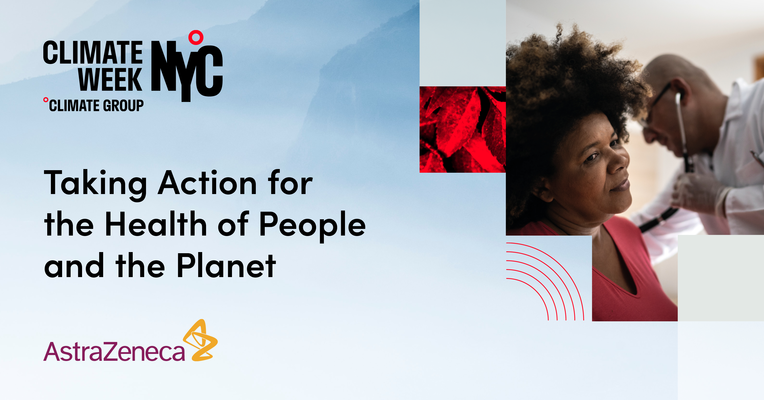From record heat waves across North America, Europe and China, to devastating wildfires in Hawaii and Canada, and floods in Sudan, the results of a changing climate are all around us. Just as dramatic as the shifts in our environment, are the corresponding impacts of the climate crisis on human health. The World Health Organization (WHO) estimates one in four deaths can now be attributed to preventable environmental causes.
Without significant action, the steep rise in heart conditions, cancers, respiratory illnesses and infectious diseases linked to environmental factors will continue, with vulnerable populations most affected. This creates an enormous burden not only on patients and their families, but on health systems and societies, costing the global economy 15% of global GDP.
“Health is the foundation of prosperous communities, strong economies and a thriving planet,” said Joris Silon, US Country President and Senior Vice President of AstraZeneca’s BioPharmaceuticals Business Unit. “The relationship between healthy people, a healthy society and a healthy planet must be at the heart of strategies to strengthen health systems so that they can meet the needs of people today and tomorrow.”

Scaling Climate Action
Fighting the climate crisis’ impact on health must be done on two fronts: by identifying scalable opportunities to mitigate harmful greenhouse gas (GHG) emissions and by helping health systems adapt to the significant health challenges brought about by the climate crisis.
“As the health sector, in our efforts to keep people healthy, we have contributed to making the planet unhealthy through our collective greenhouse gas emissions,” Silon said. “We have to break this cycle.”
The transition to sustainable, equitable and resilient health systems can be achieved by embedding sustainability in everything we do – from the lab to the patient – and by scaling learnings to accelerate progress.
- Do No Harm – Decarbonizing the Health Sector: The healthcare sector is responsible for 5% of greenhouse gas emissions worldwide – even more than aviation – with supply chains driving as much as 71% of the health sector’s total emissions. Tacking sector-wide action at scale can deliver more resilient, low-carbon healthcare.
For example, the Sustainable Markets Initiative Health Systems Task Force – a public-private partnership of CEOs and global leaders from the pharmaceutical industry, WHO, and academia originally established at the invitation of His Majesty King Charles III in his former role as Prince of Wales – came together to set joint, minimum climate and sustainability targets, encouraging the full health ecosystem to play their part in decarbonizing the healthcare value chain.
- Act Early – Keeping People and the Planet Well: The delivery of more sustainable patient care can also reduce emissions and improve health outcomes. Gearing health systems to intervene earlier to prevent, detect, diagnose and treat disease—including leveraging the latest innovations for optimal treatment at the right time—can help deliver benefits for patients and the planet.
In practice, AstraZeneca has worked with the UK’s National Health Service (NHS) in England and Scotland to increase early detection of disease and calculate the carbon footprint of medical interventions, such as how much carbon dioxide kidney dialysis is producing. Additionally, through Project SENTINEL, a collaboration with the NHS in Hull, AstraZeneca is working to deliver improvements in care for people with uncontrolled asthma and reduce the associated carbon footprint.
- Scale for Impact – Leveraging Innovation & Partnership: Cross-sector partnership is needed to create and shape policies and practices that advance decarbonization and the energy transition more broadly, as well as build more resilience into health systems.
An example of cross-sector innovation in action is a recent partnership established between AstraZeneca and Vanguard Renewables, a leader in waste-to-renewable energy projects, to decarbonize all of the company’s US R&D and manufacturing facilities with renewable natural gas created from organic agricultural waste by 2026.
“Halting and reversing the impacts of the climate crisis is a massive undertaking and none of us can do this alone,” Silon said. “We must establish partnerships, sometimes unconventional, and work together to effect real change.”
AstraZeneca is proud to be a Stream sponsor of Climate Week NYC 2023, with the aim of increasing awareness of the climate-health-equity nexus and encouraging conversations that lead to climate action.
